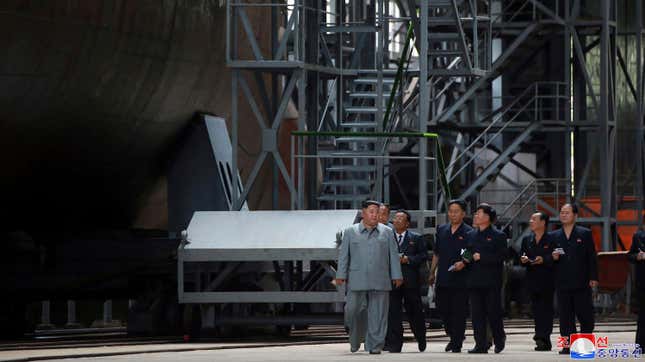
North Korea tested what’s believed to be a submarine-launched missile near the country’s east coast around 10:17 a.m. local time on Tuesday, according to South Korea’s Yonhap news outlet, the same day that South Korea kicked off the Seoul International Aerospace and Defense Exhibition. And while we don’t know if North Korea has perfected the technology of submarine-launched ballistic missiles (SLBM), it would become just the eighth country in the world with this military capability.
The North Korean missile was launched near Sinpo, the site of North Korea’s submarine shipyard, according to Yonhap, and it landed in the East Sea after traveling about 365 miles (590 km) and reaching an altitude of roughly 38 miles (60 km). Today’s launch was the eighth known missile test from North Korea in 2021.
Details about Tuesday’s test launch are still scarce, and it’s not clear whether the missile was actually launched from a submarine or from an underwater platform to simulate how a missile of this type would perform. North Korea’s two previous SLBM tests, in 2015 and 2019, are both believed to have been launched on underwater platforms or barges of some kind.
An SLBM was on display just last week at North Korea’s first big defense exhibition in the capitol city of Pyongyang, and South Korea is holding its own defense exhibition that just opened on Tuesday in the city of Seongam, south of Seoul--something that’s probably not a coincidence, as Kim Jong Un tries to gain international attention for his military efforts.
There are only seven countries in the world with functional SLBM technology, including the U.S., Russia, China, India, the UK, France, and South Korea. It’s notable that South Korea only joined the SLBM club a month ago and it’s the only country with the technology that doesn’t also have nuclear weapons.
The test launch in North Korea comes as nuclear experts from the U.S., Japan, and South Korea meet in Washington D.C. this week to discuss what could be done about North Korea’s nuclear weapons program. South Korea’s top nuclear envoy, Noh Kyu-duk, is meeting this week with his Japanese counterpart, Takehiro Funakoshi, and President Joe Biden’s special advisor on North Korea Sung Kim, a former U.S. ambassador to South Korea. Kim is expected to visit Seoul soon, according to South Korean media sources.
Former U.S. president Donald Trump last met with North Korean leader Kim Jong Un back in February of 2019 but Trump was unable to get Kim to concede anything. Like everything about Trump, it was all about the photo-op rather than actually making the world any safer.
Needless to say, South Korea’s presidential National Security Council was not happy with Kim’s test on Tuesday, especially while talks are taking place about how to bring North Korea to the table.
“The council members expressed deep regret that North Korea’s launch occurred while active consultations are under way with the United States, China, Japan, Russia and other major countries to advance the Korean Peninsula peace process,” the NSC said in a press release quoted by Yonhap.
“The members reaffirmed that stability on the Korean Peninsula is more important than ever and urged North Korea to come forward for dialogue about peace on the Korean Peninsula at an early date,” the NSC release continued.
The U.S. Indo-Pacific Command also released a statement and called North Korea’s test “destabilizing,” without mentioning America’s own frequent ICBM tests from Vandenberg Space Force Base (formerly Vandenberg Air Force Base) in California.
“We are aware of the North Korean ballistic missile launch this morning into the Sea of Japan and are consulting closely with the Republic of Korea (ROK) and Japan, as well as other regional allies and partners,” the Command said in a statement published online.
“The United States condemns these actions and calls on the DPRK to refrain from any further destabilizing acts. While we have assessed that this event does not pose an immediate threat to U.S. personnel, territory, or that of our allies, we will continue to monitor the situation. The U.S. commitment to the defense of the ROK and Japan, remains ironclad.”